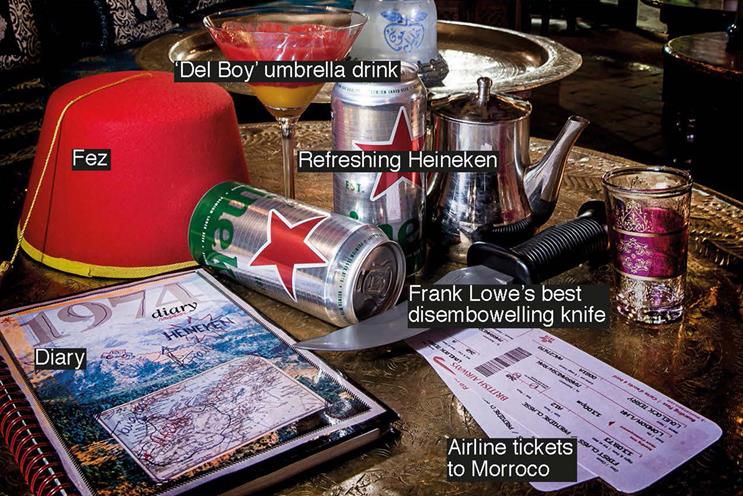About five years after the launch of 北京赛车pk10, a sheet of yellow card landed on the desk of Terry Lovelock, a copywriter at Collett Dickenson Pearce. This yellow card was a creative brief, and it called upon Terry and his partner, Vernon Howe, to create an advertising campaign for Heineken lager. The brief was just that, brief – consisting of only one word, "refreshment". Yet, eventually, it led to the creation of one of the longest-running campaigns in British advertising history – the operative word here being "eventually".
Frank Lowe, CDP’s managing director and, de facto, the Heineken account director, had given Terry and Vernon a month to come up with the campaign. But that month passed. Then another. Then a third. And still there was no sign of the elusive campaign. Terry began to think the unthinkable; that he wouldn’t be able to come up with anything. Fleetingly, he even considered throwing himself out of his window to escape this life, and the Heineken brief along with it. In the end, he decided that his fourth-floor office wasn’t high enough to ensure a good, clean death. Serious injury was the best he could hope for and he’d still have Heineken to work on, from his hospital bed. Frank would have seen to that.
By now, it was December and Vernon was asked to oversee a photoshoot in Morocco’s Atlas Mountains. On the spur of the moment, Terry decided to accompany him. He hoped that the change of scene would renew – or perhaps I should say refresh – his inspiration. This was unbeknown to Frank, who assumed that Terry would be remaining in London, not flitting off to North Africa. When Frank discovered that Terry was en route to Morocco, all hell let loose. In Terry’s words: "Frank Lowe unsheathed his disembowelling knife." This presented itself in the form of an ultimatum delivered to Terry over the radio of the minicab taking him to the airport: "Come back with a campaign or don’t come back at all."
Frank Lowe unsheathed his disembowelling knife
Vernon, a man of style and imbued with a healthy disregard for thrift when spending other people’s money, had booked the world-famous five-star La Mamounia hotel in Marrakech. While Vernon busied himself with the shoot Terry languished at the hotel, racking his brains. In desperation, he sat by the pool and wrote a script. It featured a group of bored people. To quote Terry: "The conversation was lacklustre, the dialogue artificially slowed down until a bright young waiter snatched away their ‘Del Boy’ umbrella drinks and replaced them with… yes… you guessed, Heineken! Joy broke loose."
Terry decided the script was rubbish but it ignited a spark. If drink causes some sort of metamorphosis in the brain, perhaps its effect on the body could be demonstrated in an amusing way. That’s as far as Terry got before going to bed. But, at 3am, he awoke from a dreamless sleep, sat bolt upright, and committed two lines to paper: "Heineken is refreshing all parts" and "Heineken refreshes the parts that other beers cannot reach".
The following morning, he wrote two scripts to accompany the latter of these two lines. At least with a couple of scripts under his belt, Terry could safely return to London and be allowed to re-enter the CDP building. Frank took one look at the scripts, reached straight for the phone, and called Anthony Simmonds-Gooding, the Heineken client. He said simply: "We have something wonderful for you, have a happy Christmas."
Shortly afterwards, Frank and Anthony went on a trip to the Hermitage Museum that they had long promised themselves. During the flight to Russia, Frank talked to Anthony about Heineken. Looking around for something to write on, Frank took a sick bag from the seat pocket and upon this humble receptacle wrote the great endline that was destined to deep etch its way into the British consciousness. Then he described the scripts.
To launch the campaign, three scripts were filmed, "Piano tuner", "Policemen’s feet" and "Dancers", although "Dancers" was never broadcast. Alan Parker was lined up to direct but, in the end, didn’t because he was too busy pre-producing Bugsy Malone, so Vernon took over. The finished films were then put into qualitative research.
One of the main conclusions of the research was that the commercials were – and I quote – "unlikely to promote awareness of Heineken and interest in drinking it". Wisely, Frank and Anthony ignored the research. They were right to do so. The following year, the Heineken campaign won a black Pencil at D&AD for being the "most outstanding TV campaign of 1975". And, over time, it became one of the most memorable, famous and best-loved ad campaigns of the 20th century.
But perhaps the greatest recognition the campaign received was from none other than Prince Charles. In the introduction to a book of his watercolours, His Royal Highness paraphrased the Heineken line to read: "Painting refreshes the parts of the soul that other activities cannot reach." Terry seized on this and wrote to the prince asking for permission to apply to the Lord Chamberlain for a royal warrant as "purveyor of slogans and aphorisms to HRH Prince Charles".
The prince took Terry’s request in good part and wrote what Terry has described as "rather a nice reply". Prince Charles pointed out that Terry would need to supply him with such lines for at least three years before a royal warrant could be granted. Not surprisingly, with the memory of Heineken’s long and painful birth in his mind, Terry didn’t pursue the matter. And who can blame him?
Mike Everett was a copywriter at Collett Dickenson Pearce


